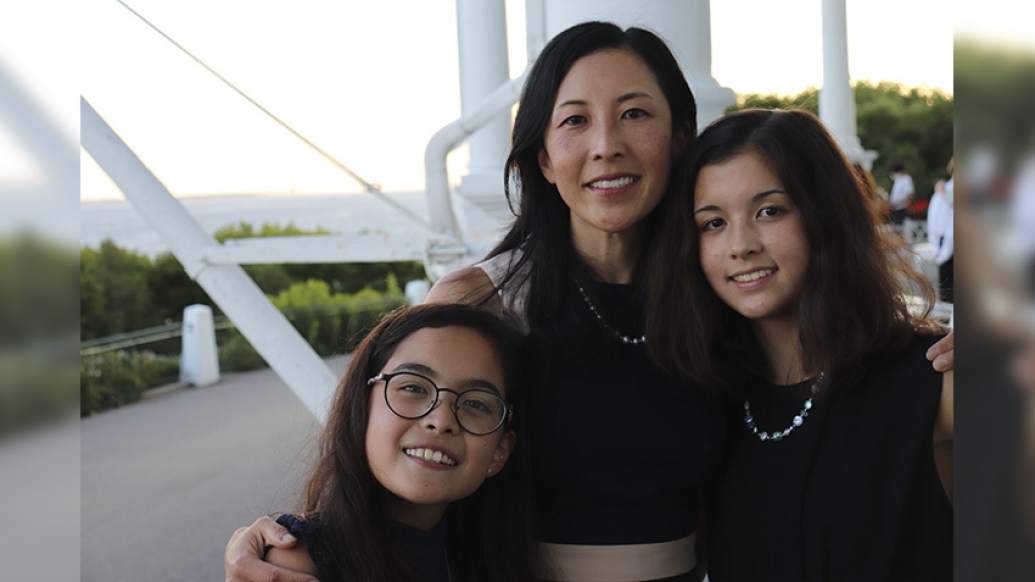Study finds physician parents often turn down career-advancing opportunities and aren’t comfortable discussing work-family conflicts with leaders. How pandemic-era changes may help.
6:18 PM
Author |

Helen Kang Morgan, M.D., had just finished her residency and was in her first year as a faculty physician when she experienced another major life change: motherhood.
She chose to step back to part time so she could better balance work with caring for their newborn daughter – and continued doing so another six years, during which she and her husband welcomed their second child.
Morgan says she was part of a family-friendly department and always had strong support from leadership. But her personal transition still meant missing some career-advancing opportunities, especially those involving travel.
And she's not alone. Many parents in academic medicine feel that real life parenting logistics can impact their professional development. Among 953 physician parents in a new survey, women were more likely than men to respond that, because of specific parenting commitments, they have turned down a project or not joined an institutional committee.
While all respondents indicated that they were not comfortable discussing work-family conflicts, women were least likely to broach these conversations with leaders, according to the findings in JAMA Network Open. Respondents also reported that parenting negatively affects promotion for women but not for men.
"We looked at physician faculty's perceptions of parenting challenges and career progression and whether perspectives differed between males and females," says Morgan, who is the lead author and associate professor of obstetrics and gynecology at Michigan Medicine Von Voigtlander Women's Hospital and the University of Michigan Medical School.
"Physician faculty identified work-family tensions and challenges related to communicating with leaders about integrating their two worlds at home and work."
Women were also slightly more likely than men to report that they had turned down a leadership role (24% of women surveyed, or 129 compared to about 19% of men, or 78.)
On the upside, both male and female respondents reported a positive culture around pregnancy, with department leadership supportive of faculty and schedule flexibility.
It was striking how frequently physician parents turned down scholarship and leadership opportunities.Helen Kang Morgan, M.D.
Morgan credits her own leaders and mentors along the way who thought of her for opportunities that contributed to her professional growth while her children were young. But she notes that not everyone has those advocates in their journey and may "fall off the radar."
"Previous studies have shown that physician women are juggling more childcare and house responsibilities than men in the field. We also know that work-home conflicts are a strong contributor to physician burnout," Morgan says.
"Our study looks at system barriers, such as institutional culture, that may also contribute to unequal career progression for women. It was striking how frequently physician parents turned down scholarship and leadership opportunities."
The pandemic normalizes conversations about work-life integration
One factor that may have dramatically changed the norm since the study was conducted – the COVID-19 pandemic.
"Part of the ethos for physicians is that you're just supposed to figure out personal life conflicts and make it work," Morgan says. "But now, we've seen private and professional lives blur out of necessity.
"The pandemic has helped us normalize conversations about how parenting and children impact our careers. This unprecedented period has provided an opportunity for academic institutions to address career growth barriers for parents, especially for women."
Other studies indicate that the pandemic has disproportionately affected parents, particularly women, who may have had cut hours or skip certain work activities in order to take on more childcare with kids in virtual school or when daycare providers were closed.
But the pandemic-era has also forced conversations around how to nurture a supportive environment for parent physicians, Morgan notes. And it may benefit institutions to preserve some changes, such as virtual conferences, which can be "a game changer" for parents of young children, she says.
Morgan, who used to travel at least twice a month for work, says virtual events have made it easier to enjoy both career boosting opportunities while easing the strain of travel at home. Family life includes daughters Madeleine, 14 and Hazel, 11, and husband Daniel Morgan, M.D., also a professor of obstetrics and gynecology at U-M's Von Voigtlander Women's Hospital.
"The disruptions we've experienced during the pandemic open doors for leaders to be engaged in improving institutional culture by acknowledging and supporting parenting challenges," she says.
"As we emerge from the pandemic, we should evaluate how recent changes, such as holding national meetings virtually, can be maintained to better support physicians juggling family responsibilities. Leaders should recognize the different professional journeys of their parent physicians and foster a culture that encourages work life harmony."
Paper Cited: "Perceptions of Parenting Challenges and Career Progression Among Physician Faculty at an Academic Hospital," JAMA Network Open. DOI: 10.1001/jamanetworkopen.2020.29076

Explore a variety of healthcare news & stories by visiting the Health Lab home page for more articles.

Department of Communication at Michigan Medicine
Want top health & research news weekly? Sign up for Health Lab’s newsletters today!





